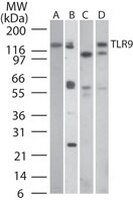OP185 Sigma-AldrichAnti-Toll-Like Receptor 9 (Ab-1) Mouse mAb (26C593)
Recommended Products
Overview
| Replacement Information |
|---|
Key Spec Table
| Host |
|---|
| M |
| Product Information | |
|---|---|
| Form | Liquid |
| Formulation | In PBS containing 0.2% gelatin. |
| Positive control | Human peripheral blood mononuclear cell lysate or Ramos cells |
| Preservative | ≤0.1% sodium azide |
| Physicochemical Information |
|---|
| Dimensions |
|---|
| Materials Information |
|---|
| Toxicological Information |
|---|
| Safety Information according to GHS |
|---|
| Safety Information |
|---|
| Product Usage Statements |
|---|
| Packaging Information |
|---|
| Transport Information |
|---|
| Supplemental Information |
|---|
| Specifications |
|---|
| Global Trade Item Number | |
|---|---|
| Catalogue Number | GTIN |
| OP185 | 0 |
Documentation
Anti-Toll-Like Receptor 9 (Ab-1) Mouse mAb (26C593) MSDS
| Title |
|---|
Anti-Toll-Like Receptor 9 (Ab-1) Mouse mAb (26C593) Certificates of Analysis
| Title | Lot Number |
|---|---|
| OP185 |
References
| Reference overview |
|---|
| Chuang, T.H., and Ulevitch, R.J., 2001. Biochim. Biophys. Acta 1518, 157. Hemmi, H., et al. 2000. Nature 408, 740. Takeuchi, O., et al. 1999 Gene 231, 59. Muzio, M., et al. 1998. J. Exp. Med. 187, 2097. Medzhitov, R., and Janeway, C.A., 1997. Cell 91, 295. |








